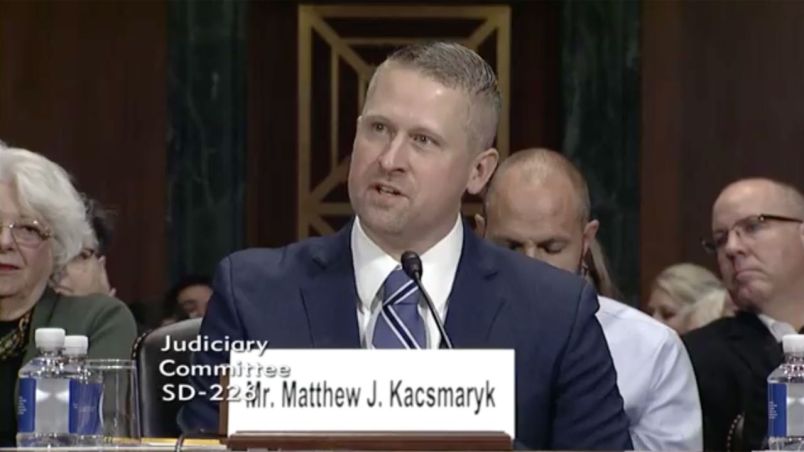U.S. District Judge Matthew Kacsmaryk in Texas stayed the Food and Drug Administration’s (FDA) approval of abortion drug mifepristone nationwide Friday, including in blue states with robust abortion protections.
The ruling will take seven days to go into effect; the Department of Justice immediately appealed it.
“My Administration will fight this ruling,” President Joe Biden said in a statement. “The Department of Justice has already filed an appeal and will seek an immediate stay of the decision.”
The same night, a separate judge in Washington state issued an order stating exactly the opposite: that the FDA maintain “the status quo” in terms of access to the drug in the states involved. The Department of Justice said in a statement it was reviewing the Washington decision.
The conflicting opinions make it highly likely the question will soon end up before the Supreme Court.
It’s not immediately clear what the effect of either ruling will be: The FDA has unfettered enforcement discretion, and there are plenty of drugs without approval on the market.
Should the Texas order be upheld, providers could also turn to misoprostol, a drug typically prescribed in concert with mifepristone, but which can be used to administer abortions alone. It’s also used to treat stomach ulcers, and thus historically has been far less restricted and targeted than mifepristone.
Shortly after the Texas ruling emerged, Sen. Ron Wyden (D-OR) called on the Biden administration to simply ignore it.
“There is no way this decision has a basis in law. It is instead rooted in conservatives’ dangerous and undemocratic takeover of our country’s institutions,” he said. “No matter what happens in seven days, I believe the Food and Drug Administration has the authority to ignore this ruling, which is why I’m again calling on President Biden and the FDA to do just that.”
Wyden told TPM earlier this year that he had discussed this idea with the White House; he also gave a speech on the Senate floor previewing it, in which he invoked Abraham Lincoln and the Supreme Court’s Dred Scott decision. Other legislators, such as Rep. Alexandria Ocasio Cortez (D-NY), echoed the idea on Friday.
The Texas decision was expected by all involved — Kacsmaryk, a Donald Trump appointee, is a constant Biden administration antagonist. He presides over all cases filed in Amarillo, and right-wing litigants have learned to file there to be sure they’ll get a judge sympathetic to their cause.
His decision is peppered with anti-abortion language and sentiment. “Because mifepristone alone will not always complete the abortion, FDA mandates a two-step drug regimen: mifepristone to kill the unborn human, followed by misoprostol to induce cramping and contractions to expel the unborn human from the mother’s womb,” he writes. He also refers to providers as “abortionists” throughout.
He regurgitates the common anti-abortion lies that mifepristone is dangerous, blatantly disregarding the consensus of the medical community, and that abortions cause women overwhelming emotional distress and regret.
His handling of the case has been at times bizarre and drawn scrutiny, including an attempt to keep a key hearing in the case secret from the press and the public until the last minute.
That Kacsmaryk has the power to issue a nationwide injunction from just one case only makes the conservative goal-to-sweeping result pipeline even more of a glidepath.
Should the Texas case be appealed, there’s not much guaranteed salvation ahead for supporters of abortion access (and those who support miscarriage care, cancer care and the many other medical treatments that involve abortions). The case will next go to the famously right-wing Fifth Circuit Court of Appeals, then, presumably, to the majority anti-abortion Supreme Court.
Over in Washington, a coalition of Democratic attorneys general filed suit to expand access to mifepristone, arguing that the FDA should lift its years-old restrictions that major medical organizations have long argued are rooted in politics, not science. While the Biden administration made the drug somewhat easier to obtain this January — including allowing certified pharmacies to dispense it — it maintained other restrictions.
In his opinion ordering that mifepristone be kept available, Judge Thomas Rice pointed out that “the record demonstrates potentially internally inconsistent FDA findings regarding mifepristone’s safety profile,” citing the fact that mifepristone prescribed for Cushing’s disease — rather than abortion — is not subject to those onerous restrictions.
Another countervailing lawsuit is still playing out in West Virginia, where a maker of mifepristone is suing West Virginia, arguing that its abortion ban is violating both the Supremacy and Commerce Clauses of the Constitution in overriding the FDA conclusion that the drug is safe.
Read the decisions below:



